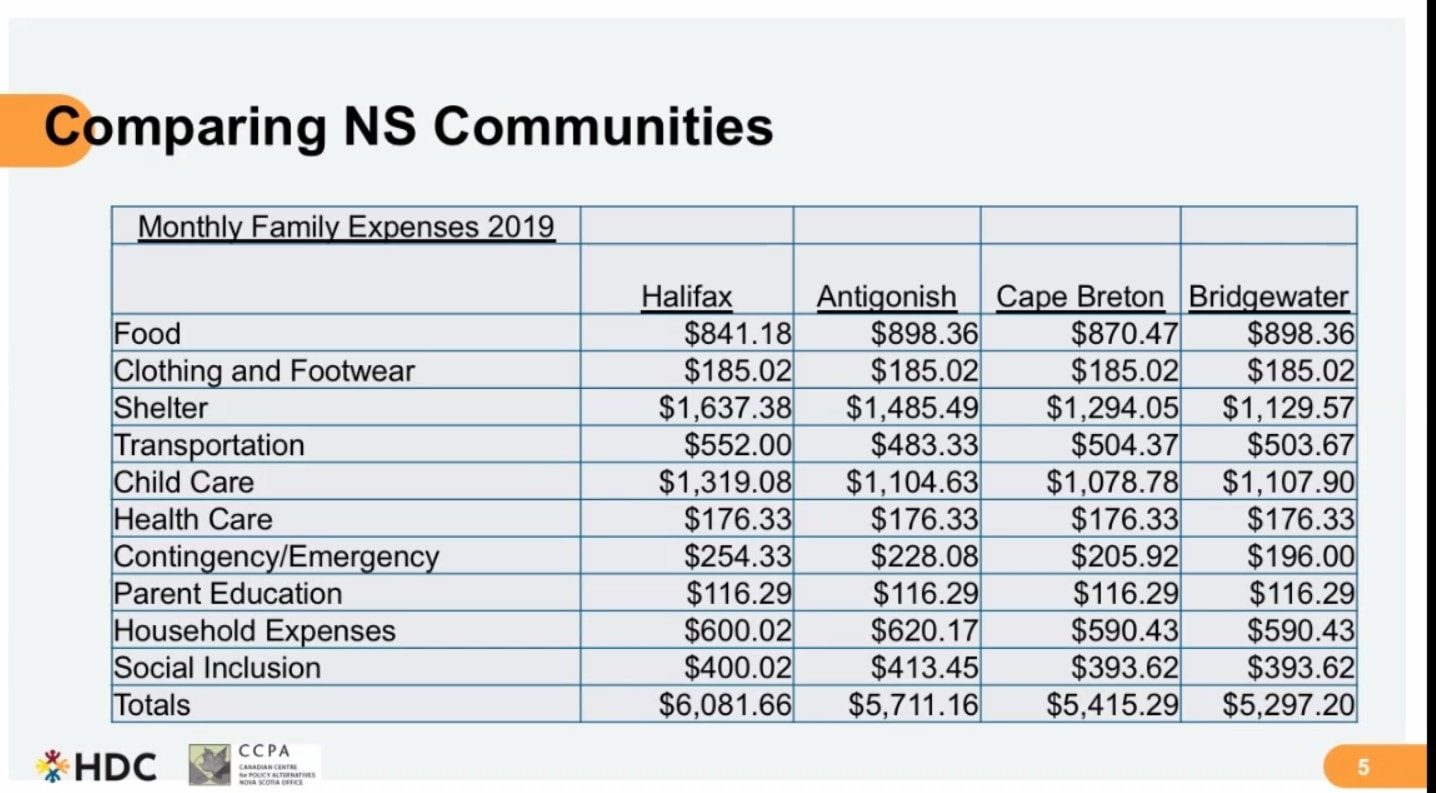
KJIPUKTUK (Halifax) – In order to provide for their family and live a somewhat comfortable life people living in Halifax should earn $21.80 per hour. For people who live in the Town and Municipality of Antigonish that hourly wage is $19.55. For Bridgewater it is $16.80 and for people living in the Cape Breton Regional Municipality it is $17.65. For Saint John, New Brunswick, it is $19.55.
Those are the conclusions of a recent report by the Nova Scotia chapter of the Canadian Centre for Policy Alternatives (CCPA), launched at a Zoom press conference this morning. The report was written by Christine Saulnier and Chelsea Driscoll.
What’s a living wage?
The idea is that to live a dignified life you need a living wage, enough money to live in a safe and decent home, eat healthy food, buy clothes when you need them, and pay for childcare and transportation.
Most importantly, it means not constantly stressing out about how to pay for all of that.
“This is not a poverty wage. This is a wage that is very much about providing a decent quality of life to workers,” Saulnier said at the launch.
In order to calculate this living wage the CCPA researchers considered local conditions affecting the cost of basic needs such as food, clothing, shelter, utilities transportation, childcare and emergencies.
The calculations are based on the needs of a family of four, two adult breadwinners working 35 hours per week, a four-year old in childcare, and a seven-year-old in before-and-after-school childcare. Taxes, EI deductions, as well as government benefits are included in the calculations.
Tellingly, the budget includes the cost of two educational courses for one parent, contingencies, and what it calls the cost of social inclusion, things like modest sports fees, a child’s birthday gifts, and maybe a movie once in a while.
“This category is really meant to lessen stigma and to allow family members to participate fully in the life of their community,” Saulnier said.
The differences between calculated living wages from area to area reflect differences in rents, child care, transportation, etc.

“When we’re advocating for a decent standard of life for everybody, we often bump up against these ideas that workers don’t need to earn as much in Atlantic Canada because there’s a lower standard of living. This is why these living wage calculations are so important to us. It gives us data that is based on facts and that can’t be refuted by policymakers and by big business, said Suzanne McNeil, president of the Halifax-Dartmouth and District Labour Council, who sat in on the report launch.
A living wage is not just the domain of the employer, the report argues. Government has a role to play as well. When the federal government increased its child transfer, the living wage in Halifax dropped by almost one dollar. But similarly, the Halifax family saw its Canada Child Benefit clawed back this year because rising rents and other expenses pushed their income upwards.
Similarly, more government funding for early learning and childcare, public transportation, healthcare, food security and affordable housing would drive the living wage down even further.
During the last municipal election many Halifax councillors committed to requiring contractors with the city to pay their workers a living wage, following the example of Vancouver and other Canadian municipalities. But four years later we’re still waiting and the city is still “studying” the issue.
See also: Halifax living wage ordinance slips away into a distant future and Council is fine with that
With a special thanks to our generous donors who make publication of the Nova Scotia Advocate possible.
Subscribe to the Nova Scotia Advocate weekly digest and never miss an article again. It’s free!




A living wage for a person with both serious medical issues and a physical mobility issue would need to be much higher to not only cover the regular extra expenses but for large expenses such as a wheelchair, and a gazillion other things I could list off. Since I’ve been using a wheelchair, I’ve spent at least $4000 hiring people to do all kinds of things for me that homecare wouldn’t or couldn’t do. DCS didn’t reimburse me despite me letting my caseworkers know that I had to hire someone to do something that was a direct result of my being in a wheelchair.
People with diabetes and Celiac disease have more expenses, as would someone undergoing dialysis. Dental work is a huge expense for anyone without insurance. Just a few examples.